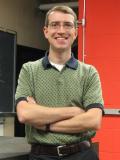

Physics Professor David Hanneke graduated with a Bachelors of Science from Case Western Reserve Univ. He received his Masters of Arts and Ph.D. from Harvard University.
What major products have you worked on in the past?
So, I’ve done a couple of things before coming here. I was a graduate student at Harvard. And at Harvard, I trapped a single electron, and measured its magnetic moment to three parts and 10 to the 13 so lots of digits. That’s actually a really good test of relativistic quantum mechanics; something called quantum electrodynamics. Then as a post-doc, I was at the National Institute of Standards and Technology in Boulder, Colo. where I worked on trapping individual atoms and really controlling their quantum states very well. The goal there was to build a quantum computer, and we realized the first programmable 2-quantum-bit quantum computer.
I read that it is not ready to be created into a laptop or desktop quite yet.
Yeah, it is hard to control things at the quantum level, and it will take more time before we have a full-fledged quantum computer. But there are some interesting things that they can be utilized for.
Like what?
So there are a number of algorithms that can be done more efficiently, searching unstructured databases more efficiently. Factoring large numbers interests lots of people because it is the basis of modern encryption algorithms.
What created your interest in physics?
I have always been interested in how things work. As a kid I would take apart TV sets and see what was inside. What I liked about physics is that you can ask that question about everything and about nature itself. How a star or atom works, and you can answer those questions fairly well.
What brought you to the College?
Amherst is a special place. The words that people use sometimes is research college. It is one of the few places in the world where you can have a good teaching interactions with students but also have a vibrant active research lab where you are both teaching, and your teaching is respected and supported by the college, but also pushing the forefronts of knowledge. Also being able to involve the students, which is a nice educational tool to push students to ask questions that nobody can answer.
What research are you currently working on?
I am leveraging my knowledge of trapping individual things, individual atoms, individual particles to answer big questions like, do the fundamental constants change in time? So there are these numbers that, as far as we know, are constant through all of space and time, but there are multi-dimensional theories that predict changes in time. Although they have not been seen in labs, we can actually push the limits of measurement at Amherst. I am setting a lab up to look at that, and to see if the laws of physics work the same forward and backward in time.
My dorm actually had a discussion about that because everyone had watched Through the Wormhole with Morgan Freeman.
They were actually in my lab at NIST filming; interviewing the people who control the master clock for the U.S. For their cool laser shots, they filmed in my lab. I didn’t get to meet Morgan Freeman, but I saw the film crew.
What classes do you teach?
I teach the Modern Physics, a 225 sophomore introduction to special relativity and quantum mechanics. And those are the two big things that people like about physics, so it’s really exciting. I am also teaching the laboratory section of Physics 116, the Introduction of Mechanical Physics. It is very different to the other class, we are in a lab shooting things with canons which are called ballistic pendulums. That is what I am teaching this semester. Next semester I am teaching Quantum Mechanics, junior level physics and labs for Physics 117.
How are you going to use your knowledge to benefit the students at Amherst?
In the classroom it is easy; I have lived and breathed these things so I can bring real-life examples instead of the textbook examples because I have done some of these things. The lab is a good experience for a student so that they can think about how to ask a question that nobody can answer and be able to answer the question. Part of teaching is leading students towards those questions, and towards those questions that can be accomplished in a year-long thesis because the students only have four years here at Amherst. I am asking these big questions that can be broken down into steps so that students can assist. I have a senior thesis student who is designing and building lasers to trap atoms for my lab. He has never done it so he is gaining experience, and I have done it before so I can help him succeed.
How has Amherst been treating you?
It has been a lot of fun. I have found the students enthusiastic in class, interested in the material. The faculty has been very supportive. I’ve had a lot of fun so far.
What do you hope to accomplish this semester?
I hope to share my enthusiasm for physics with the students and especially non-majors. I hope they walk away with a positive experience and some knowledge about science because the questions facing us in society today are scientific in origins. I would also like to have a good start on the research program.